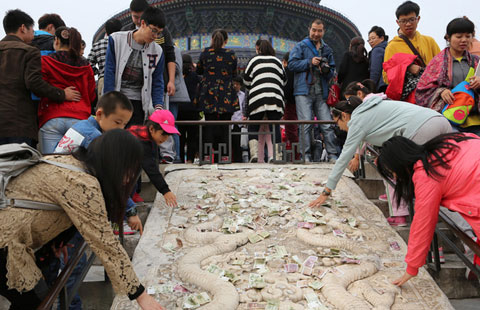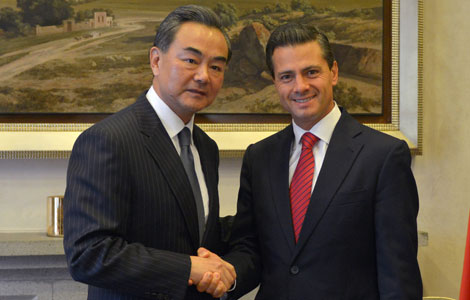Pioneer that became giant faces tough competition
Updated: 2014-10-06 11:59
(China Daily)
|
||||||||
Changli county in Hebei province had the market to itself when it produced China's first bottle of dry red wine, but the situation is very different now, according to an official.
However, the county remains one of the key areas in China for red wine production, said Zhang Peng, who works for the local industry's administration committee.
In 1979, a winery in the county started to experiment with red wine. After four years of research, it successfully made the first bottle of this style in China, using the cabernet sauvignon grape variety. The wine was given the brand name Beidaihe.
Early grape growers in the region imported cabernet sauvignon vines from France. After more than 30 years of development, vines from Changli have been adopted in other wine areas such as the Ningxia Hui autonomous region and the Xinjiang Uygur autonomous region.
As for that original winery, it became the COFCO Huaxia Greatwall Wine Corp, part of the China Oil and Foodstuffs Corp, and now produces 50,000 metric tons of wine each year. One of its ranges, Great Wall, is among the most popular brands nationwide.
Even so, Zhang said the company is facing considerable pressure from other winemaking regions, such as Ningxia and Xinjiang.
These two emerging winemaking areas have abundant land for growing grapes, and this has helped them to attract investment from many large companies.
In view of this competition, Changli, as an established winemaking area, needs to make the most of its own advantages, Zhang said. The county has a research team of 200 people who are engaged in the study and promotion of vine cultivation. Its experienced winemakers are often invited to other parts of the country to share their expertise.
Changli also has geographical advantages for growing grapes. The coastal city of Qinhuangdao, where Changli is located, is similar to the Bordeaux area in France, a notable wine-producing region in terms of its soil, sunlight and climate.
The wine industry cluster is located at a latitude of 39 degrees north, within the band between 30 and 45 degrees north that is internationally recognized as a golden growing area for vines where the natural conditions are beneficial to grape growth.
In addition, tests have showed that Changli's grapes contain more than 100 kinds of aromatic substances, more than are found in fruit from China's other winemaking areas.
These advantages have encouraged 80 wine-producing companies to settle in the area. The county's total production of wine is 210,000 tons annually. The area planted with vines covers 6,667 hectares.
Among those companies is Swarovski, the world's largest crystal jewelry producer, which invested in a winery in Changli in 1999.
The winery, Bodega Langes, uses a system that employs gravity rather than pumps to move wine during the production process, a natural method that is said to improve the flavor.
With an annual production of 300 tons, Langes sells its products only to well-heeled consumers who register with its membership system.
Another company, Kweichow Moutai, a premium Chinese liquor maker, also invested in Changli and began making red wine in 2002.
Over the following decade, it developed into one of China's top 10 producers, and its annual output has reached 10,000 tons.
It is not just large companies that have become involved - a number of local farmers have also begun to make wine.
In 2013, the cluster's sales income reached 1.5 billion yuan, and the industry has created more than 70,000 jobs.
Zhang said Changli is now seeking to develop a complete industrial chain that includes growing grapes, winemaking, barrel and bottle production, packaging and wine tourism.
Restrictions on the presentation of gifts to officials have reduced the amount of wine bought by well-off consumers, and imported wines have also had an impact on the domestic market.
"Changli's winemakers will have to adjust their policies to produce wines that suit the tastes of mainstream customers in China," Zhang said.

 Visitors trade cash for luck at World Heritage site
Visitors trade cash for luck at World Heritage site Sharapova beats Kvitova to win China Open
Sharapova beats Kvitova to win China Open
 China-Mexico ties deepen
China-Mexico ties deepen
 58 couples say 'I do' among the clouds
58 couples say 'I do' among the clouds
 Chinese convoy fleet executes escort missions in Gulf of Aden
Chinese convoy fleet executes escort missions in Gulf of Aden
 Chinese FM Wang Yi meets with Mexican president
Chinese FM Wang Yi meets with Mexican president
 China leads medal table as Asian Games close
China leads medal table as Asian Games close
 Highlights at Paris auto show
Highlights at Paris auto show
Most Viewed
Editor's Picks

|

|

|

|

|

|
Today's Top News
Some protesters in HK decide to withdraw
China startups 'get smart' about healthcare devices
US, India stir S. China Sea debate
Brazilians more aware of breast cancer symptoms, survey finds
Ebola patient in Dallas struggling to survive, says CDC head
Ebola could reach France and UK
China's Xinjiang Corp marks 60th anniversary
19 arrested over clash in Hong Kong
US Weekly

|

|







